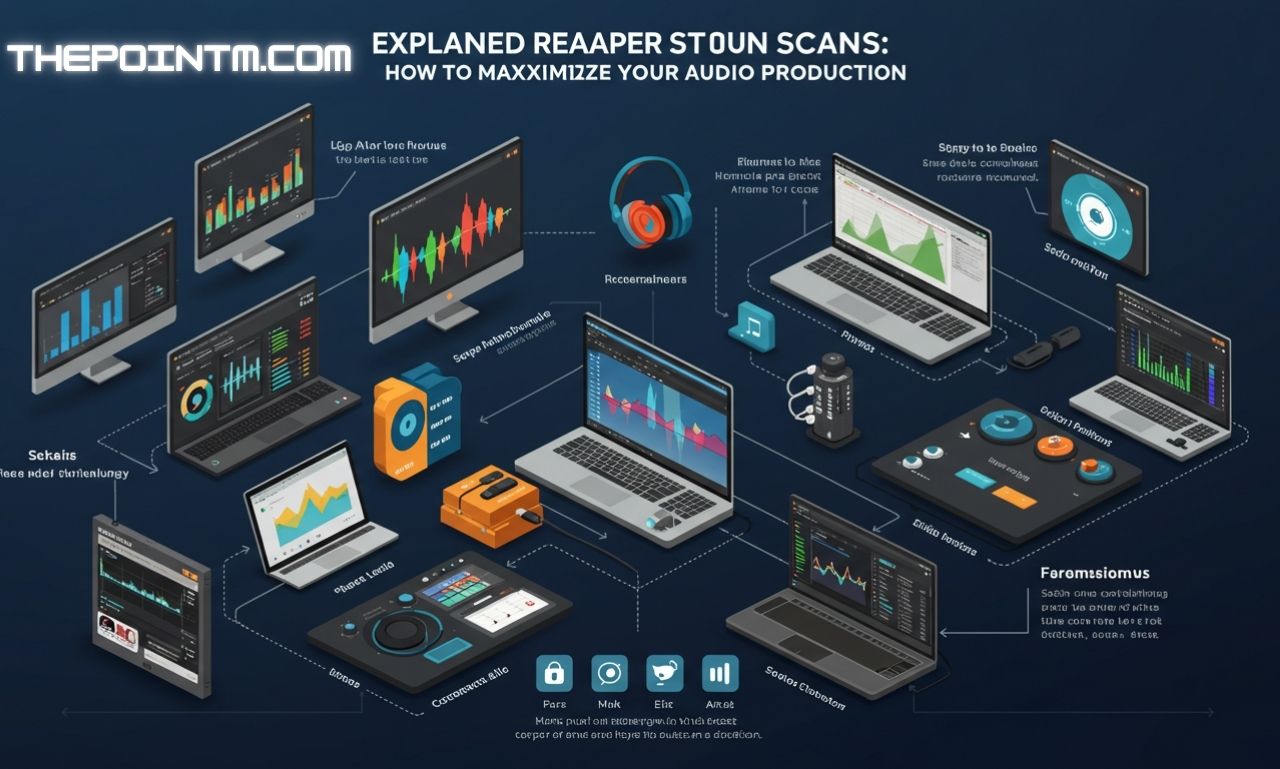In the fast-growing world of music and audio production, efficiency and creativity go hand in hand. One tool that has gained immense popularity among producers, sound designers, and podcasters is explained reaper scans: how to maximize your audio production. Reaper is a digital audio workstation (DAW) known for its lightweight design, flexibility, and professional-level tools. Reaper , a core function within the software, enable users to organize, detect, and optimize plugins and instruments seamlessly. Understanding this function is key to unlocking the full potential of audio production and creating polished results.
What are Reaper Scans and Why They Matter
Reaper scans refer to the process through which the DAW identifies and catalogs plugins, virtual instruments, and effects. This function ensures that every tool available to the producer is accessible and ready to use. Unlike many other DAWs, Reaper provides a highly customizable scanning process, allowing users to manage large plugin libraries efficiently.
| Feature of Reaper Scans | Benefit | Impact on Production |
|---|---|---|
| Plugin Detection | Recognizes VSTs and AUs | Expands creative toolkit |
| Custom Paths | Lets users specify folders | Saves time in organization |
| Stability Check | Identifies broken or outdated plugins | Prevents crashes |
| Fast Scanning | Reduces workflow interruptions | Keeps creativity flowing |
Through these features, explained reaper scans: how to maximize your audio production showcases how an organized workflow leads to better results.
Setting Up Reaper Scans for Maximum Efficiency
To maximize audio production, the setup of reaper scans must be approached with precision. Users can define plugin paths, remove duplicates, and prioritize their most-used tools. By doing so, Reaper provides quick access to essential effects without wasting valuable studio time.
An optimized setup involves:
-
Assigning dedicated folders for VST instruments and effects.
-
Running scheduled scans to detect new plugins.
-
Removing corrupted or duplicate files that may slow down the system.
This preparation ensures smooth creative sessions without technical distractions.
Workflow Benefits of Explained Reaper Scans
Efficient workflow is one of the main reasons producers turn to Reaper. The scanning process plays a critical role in maintaining speed and consistency. Instead of manually searching for plugins, producers can rely on automatic scans that neatly categorize everything.
For live performers, this organization means instant access to instruments and effects during real-time sessions. For studio professionals, it means less time troubleshooting and more time crafting sound.
Audio Quality and Creative Potential
High-quality audio depends on more than just recording equipment—it requires an organized digital environment. Reaper scans allow creators to experiment with effects, layering, and virtual instruments without interruption.
By ensuring every plugin is detected and functional, scans give producers the freedom to explore creativity. Whether layering vocals, designing soundscapes, or mixing film audio, the ability to access tools quickly enhances overall quality.
The Role of Reaper Scans in Professional Studios
Professional studios demand reliability and scalability. With multiple projects and clients, producers cannot afford downtime due to plugin errors. Reaper scans address this by verifying plugin stability before use.
| Studio Need | Reaper Scan Solution | Result |
|---|---|---|
| Large Plugin Library | Organizes and categorizes | Faster project setup |
| Client-Specific Tools | Allows custom paths for different projects | Greater flexibility |
| Error Prevention | Flags unstable plugins | Reduces downtime |
| Multi-Device Use | Syncs scan settings across systems | Streamlined workflow |
For professionals, explained reaper scans: how to maximize your audio production is not just about convenience—it is about ensuring dependability in high-pressure environments.
Comparing Reaper Scans with Other DAWs
While other DAWs also scan for plugins, Reaper’s approach is unique because of its customization and speed. Unlike bulk scanning processes that slow down workflows, Reaper offers efficient incremental scans, updating only what has changed.
This flexibility allows producers to maintain creative flow without long interruptions. Compared to traditional DAWs like Pro Tools or Logic, Reaper stand out as lightweight yet powerful.
Troubleshooting with Reaper Scans
Even the most advanced producers encounter plugin issues, but Reaper scans simplify troubleshooting. If a plugin fails to load, users can re-scan specific folders instead of reloading the entire library. This targeted approach saves valuable time and prevents workflow disruptions.
Additionally, diagnostic tools within Reaper highlight faulty plugins, allowing users to remove or replace them immediately. This ensures consistent reliability across projects.
Future of Reaper Scans in Audio Production
As audio technology advances, scans will continue to evolve. With the integration of AI, we may see intelligent scanning systems that recommend optimal plugins for specific projects. Real-time cloud syncing could allow producers to share scan settings across devices and studios instantly.
Looking ahead, diag-based scanning systems may even analyze plugin performance to suggest better alternatives. This evolution means Reaper will remain competitive in shaping the future of professional audio production.
How to Maximize Creativity with Reaper Scans
Maximizing audio production with Reaper scans is not only about technical setup—it’s about fostering creativity. When tools are organized, producers can focus on composition, mixing, and storytelling through sound.
Artists can dedicate more time to experimenting with effects, layering tracks, and creating unique soundscapes. By eliminating technical clutter, scans empower producers to fully unleash their creative potential.
Conclusion
Exploring explained reaper scans: how to maximize your audio production reveals just how crucial this function is for efficiency, quality, and creativity. From organizing large plugin libraries to preventing errors and boosting workflow, reaper ensure producers can focus on what truly matters—sound.
For beginners, it simplifies entry into audio production. For professionals, it provides the stability and flexibility needed to meet demanding client expectations. As technology evolves, reaper will only grow more intelligent and powerful, shaping the future of digital audio work.
By understanding and optimizing this feature, every producer can maximize their potential and transform ordinary projects into extraordinary sound experiences.

